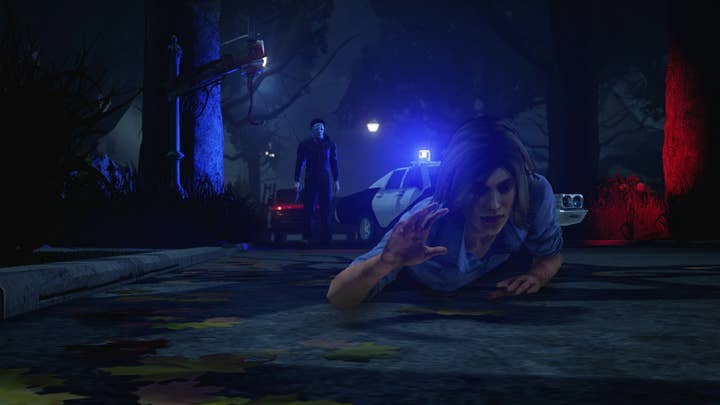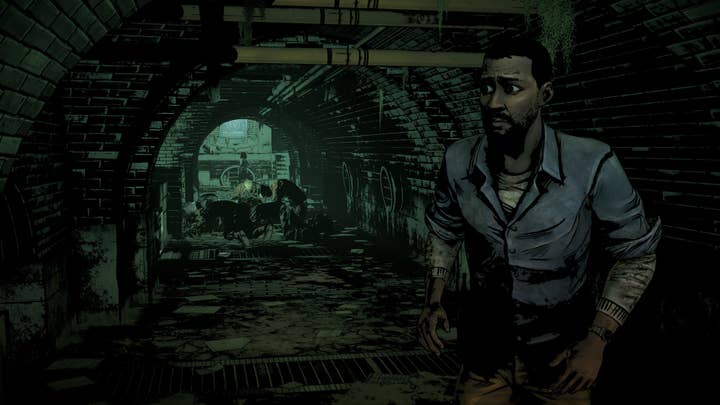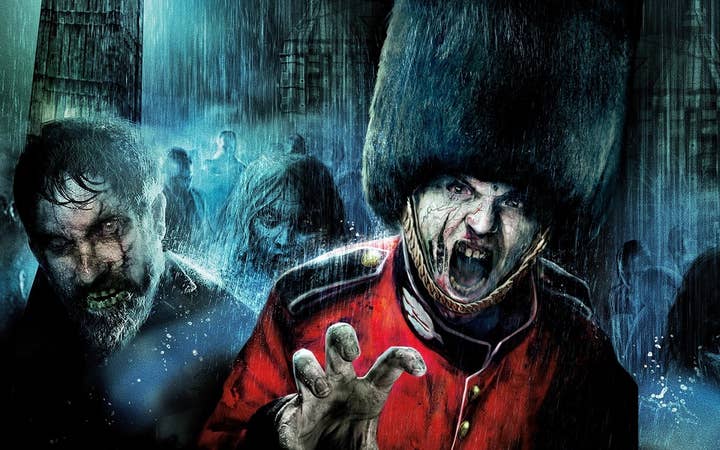The games industry can be a scary place | 10 Years Ago This Month
Let's revisit the headlines of October 2012, sorted by which subgenre of horror movies they most closely resemble
It's just about Halloween and my Twitter timeline is full of people talking about scary movies, so it's a good time for a seasonally appropriate gimmick article. Fortunately (or not), the games industry turns out horror stories so regularly that we can do such a column using nothing but stories from exactly a decade ago.
The neat thing about scary movies is that there's actually a tremendous variety of films that fit under that umbrella term, and gaming has a news equivalent for a whole bunch of them.
Slasher films

Take the slasher film, for example, in which a remorseless and unrelenting monster is a constant threat, looming over every scene and seemingly behind every bush. It is an oppressive force that comes for everyone and cuts them down without warning or mercy. The killer in these movies is often a metaphor for some greater social ill, a rot originating from damage done long ago but now being visited upon unfortunate fresh-faced innocents.
For games, that means layoffs, and October of 2012 was a bit of a bloodbath. We saw headcount slashed at Microsoft/Lionhead, Ubisoft, Zynga, Activision Publishing, Habbo Hotel manager Sulake, Turbine, Backbone Entertainment, THQ Australia, Bigpoint, and Starhawk developer Lightbox Interactive.
G4 also cut talent when it cancelled X-Play and Attack of the Show, a move that got its own 10th anniversary remake this month when the network shut down for the second time.
Double Fine Productions founder Tim Schafer even spoke out about the frequency of layoffs in the industry, saying, "After Psychonauts, we could have laid off half our team so that we'd have more money and time to sign Brütal Legend. But doing so would have meant breaking up a team that had just learned how to work well together. And what message would that have sent to our employees? It would say that we're not loyal to them, and that we don't care. Which would make them wonder 'Why should we be loyal to this company?'"
But as any fan of slasher movies knows, there is no such thing as safe haven; Double Fine would have its own layoffs two years later.
Zombies

But maybe you're more of a fan of zombie flicks, things that are dead yet still continue to move? Maybe you're afraid of the uncanny valley nature of the shambling undead, monsters that are at once recognizably human, but also different enough to be perverse and unsettling just the same.
One thing that I always liked about zombie movies is that they were the horror movies where the antagonists could actually win
One thing that I always liked about zombie movies is that they were the horror movies where the antagonists could actually win. Slashers get killed (or "killed"), werewolves and vampires fall prey to silver bullets and sunlight, poltergeists get exorcized. But zombie movies can go either way.
A decade ago, we had a couple zombie stories that turned out very differently.
On the one hand, we had a Kotaku story about Silicon Knights that painted the Eternal Darkness studio as the walking dead, a shell of a company with fewer than five employees barely a year after launching the critical flop X-Men: Destiny and months after losing its years-long legal battle with Epic Games to the tune of $4.5 million.
Silicon Knights would essentially die the next year even as it remained extant on paper to pursue an unsuccessful appeal of the Epic judgment, but something that looked very much like Silicon Knights rose from its grave. Silicon Knights studio founder Denis Dyack had announced his next venture, Precursor Games, which would make a spiritual successor to Eternal Darkness with many of the same employees (and even some of the same computers) from his old studio.
Over the course of four months, Precursor launched a Kickstarter campaign, cancelled it halfway through when it was falling far short of its funding goal, had its founding member and director of content arrested for possession of child pornography, then re-launched its Kickstarter with a lower funding goal that it would also fall far short of, and finally put the whole thing in the ground, seemingly for good. (To be fair, this one could also have been a disaster movie.)
So what about the zombie movie where the undead win out in the end, the flick where the things everybody agrees are dead simply refuse to go along with it? (Regular readers of this column may have guessed this is where this bit is going.)
Our interview with Blizzard chief creative officer Rob Pardo fits the bill there, as the World of Warcraft veteran responds affirmatively to a question about whether he sees big-budget single-player games as an endangered species.
"I do," Pardo said. "I don't see there being a great business model for it these days. It's really sad, there's just a lot of elements out there that conspire to make those games difficult to make now. Between pirating or the ability for people to rent games, it's hard for publishers to pour millions and millions of dollars into a game and not necessarily see the return they need to make those budgets realistic."
How long was 10 years ago? Apparently it was renting-games-was-still-a-concern-for-developers long ago.
I wouldn't be surprised if this is the last traditional console generation... Rob Pardo
Pardo was then asked this column's favorite question: "Looking forward five or ten years, how do you think gaming is going to change?"
"The big question is: Is this upcoming console generation going to be as successful as the last one," Pardo asked, sneaking up on our other favorite Bad Call. "Tablets are getting more and more popular, mobile's getting popular. The computing and graphics power in those systems are really going to catch up rapidly… I wouldn't be surprised if this is the last traditional console generation and it evolves into something new after that."
You can argue semantics about whether big-budget single player games are "endangered" or whether the new generation of consoles have evolved into something new, but I'll be too busy sitting over here playing Sony's entire lineup of single-player blockbusters on the industry-leading PS5.
Granted, neither single-player games nor consoles are the industry-dominating force they once were, so it's tough to say the zombies won in this case, but perhaps they reached a sort of status quo with their live service counterparts, something a bit like what you would have seen in Fido or Land of the Dead.
Psychological horror

But zombie and slasher movies tend to be a little gory. And as much as the games industry hates to hear it, that kind of over-the-top violence gets a little desensitizing after a while.
But that's where psychological horror excels. It's less about the visceral sensationalism, and more about a creeping, unsettling fear of A Thing That Should Not Be slowly revealing itself, and the alienating dread of realizing one's friends and neighbors not only don't share your revulsion, but they are welcoming the abomination with open arms.
For that, we have another glimpse of the ongoing industry dialog over free-to-play and social games monetization practices.
In an interview at the London Free-To-Play Summit, Boss Alien's Jason Avent did a victory lap for the studio's first game, CSR Racing, proclaiming it a roaring success even though it was bombarded with one-star reviews for its aggressive monetization. Avent dismissed them as a form of "xenophobia," and suggested the tactics being used were a result of developers learning to use free-to-play models for the first time.
"In many ways, actually, it's more evil, because it's more psychologically manipulative. But it helps you" Jason Avent
"We're trying everything, and as a result I think it can come across as quite crude," Avent said. "Because we can control the universe the player is in, there's no reason why we can't start selling to you based on your previous experience, and the experience of others who have followed a similar path that you have. It feels much more natural, but it's the same thing. In many ways, actually, it's more evil, because it's more psychologically manipulative. But it helps you."
I've seen a lot of flimsy justifications for bad behavior in this industry, but it's weirdly refreshing to hear someone just come right out and say, "It's more evil… but it helps you."
Thankfully, other people who made that same assessment of psychological manipulation in free-to-play games decided that was a bad thing, actually. In a session at GDC Online, Amazon.com designer Nik Davidson criticized the whale-centric approach of free-to-play games.
"We like to think that the ones spending vast sums on these games are sons of Dubai oligarchs, but we have the data to prove that they're not, and that they probably can't afford to spend what they're spending," Davidson said. "We're saying our market is suckers – we're going to cast a net that catches as many mentally ill people as we can!"
"We like to think that the ones spending vast sums on these games are sons of Dubai oligarchs, but we have the data to prove that they're not" Nik Davidson
And of course, there are other kinds of psychological thrillers, where characters are made to question their own sanity and reality as they know it. The term for that – gaslighting – is in itself a reference to the Ingrid Bergman file Gaslight, in which an abusive husband manipulates his wife into believing she is losing her mind.
Ten years ago, a Kixeye contractor posted a Tumblr blog under the name Qu33riousity, saying they were pulled aside and told they were "dressing too thuggish" at work. When the contractor responded by detailing various racist, sexist, homophobic, and transphobic things they had witnessed in the office, they were told by a manager, "Whoa whoa whoa, those comments you're hearing aren't racist; they're jokes!" and "The problem is that you're too sensitive. You need to check all that at the door before you come here to work."
Qu33riousity responded that it's impossible to separate the realities of the world from life in the workplace, and was told, "No, you're too sensitive, that's the problem. I acknowledge that racism happens out there in the world at times, but racism doesn't happen in this office… Besides, there are transvestites on the team that I hired."
The manager added that it was okay to make jokes about slavery because slavery was over.
Fortunately, the contractor's public post resulted in more action than their complaint to the manager. Kixeye announced it had fired four people at the heart of the stories two days after the blog post went up.
Horror subgenre speedrun any%
Just a few more genres and this metaphor will be so tortured it could count as a Saw film. Speaking of which…
Exploitation – Foxconn was generating horrible headlines again. Workers had already threatened mass suicides and had multiple riots at the manufacturing giant in 2012, and in October they began a strike across multiple facilities, bringing iPhone 5 production to a standstill. Later in the month, Reuters reported that the company had been using child labor in its factories, with children as young as 14 helping assemble consumer electronics as part of an intern scheme. Nintendo said it would investigate the matter at its manufacturing partner, as it generally frowns upon child labor (Timmy and Tommy Nook aside).
Witchcraft / Selling your soul to the devil – Chris Roberts announced Star Citizen 10 years ago this month, saying he was going to make the game with a budget of up to $12 million, and between $2 million and $4 million of crowdfunding. A decade later, the game still hasn't fully launched, but it has raised almost $508 million from more than four million people. That doesn't seem possible, so I'm left to believe the whole thing belongs in one of these two sub-genres.
Evil caretaker – Whether it's a nanny, a babysitter, or a step-parent, horror movies love to have the safety of some poor innocent entrusted to some nefarious thing that will try to kill them. Like when Nintendo was depending on third-parties to carry the Wii U's early days, with president Satoru Iwata saying, "Nintendo tends to release too many titles at the launch of a hardware system and as a result suffers a drop in new games for quite some time after launch, and for the Wii U launch, we are being very careful not to let it happen. Fortunately, third-party publishers overseas are launching many titles for us this time, and we were able to push back the release of some of the titles that we had originally intended to release as launch titles until next year."
That didn't turn out great, in large part because those third-parties were mostly turning out afterthought ports of previously released games. And like so many good horror movies, this one had a little prologue where someone else making the same mistake had already met with a grisly fate.
Techno-horror – Ubisoft released a physical version of Rocksmith on the PC, but it forgot to include the CD keys necessary to activate the software.
What else happened in October 2012
● George Lucas sold Lucasfilm to Disney for just over $4 billion, about the same price it paid for Marvel in 2009. Take the price of both of them put together, and it's less than Tencent paid for an 84% stake of Supercell. It's less than two-thirds of what Take-Two paid for Zynga. Multiply Disney's purchase price for a massive piece of many people's childhood eight times over, and you're still almost $5 billion short of Microsoft's acquisition price for Activision Blizzard.
● Microsoft debuted the Surface tablet.
● Apple announced the iPad Mini.
● It was a busy month of big releases, with titles like XCOM Enemy Unknown and Dishonored receiving rave reviews while Resident Evil 6 was not well received by critics, with Eurogamer's Simon Parkin calling it "an unwieldy tribute to the series' past, an uneven expression of its present and an unwelcome indication of its future." (Capcom seemed to get the message; Resident Evil 7 took the series in a very different direction and it seems to have been on a more successful track ever since.)
● Polygon formally launched with a staff of big-name game journalists – well, big-name relative to game journalists in general – and a promise to be a different kind of website with an emphasis on long-form feature coverage. It would cut its feature staff less than two years later when such an idea proved financially untenable.
● Well aware that the games industry was shifting toward digital distribution and its used game business was under siege, GameStop continued to experiment, launching 80 seasonal GameStop Kids stores in malls across the US to sell family friendly brands like Skylanders, Angry Birds, Lego, Star Wars, and Minecraft.
GameStop management of the era understood its situation and tried repeatedly to diversify and adapt in interesting (albeit ultimately unsuccessful) ways, which is one reason I continue to think the modern meme stock version of the retailer is doomed, particularly when its innovations are limited to an NFT marketplace and trying to out-Amazon Amazon.
● The Xbox 360 received its first commercial free-to-play game (as opposed to advergames like Doritos Crash Course or giveaways like Aegis Wing) in the form of Toylogic's Happy Wars. As surprising as it may be to find out Microsoft was that late to the party, it may be even more surprising to learn that the game was only playable by Xbox Live Gold subscribers at launch. Even 10 years ago, Microsoft didn't quite "get" the free-to-play business model.
Good Call, Bad Call
GOOD CALL: In talking to us about Happy Wars, Toylogic president Yoichi Take saw the free-to-play model as something additive to traditional models rather than something that would replace them entirely, saying, "I predict that, moving forward, even triple-A titles will be shifting toward Play-for-Free. However, there are game designs that can only be realized as package titles, so I feel that package games and the Play-for-Free model will coexist, and indeed I welcome their coexistence."
BAD CALL: Getting back to the horror theme for a moment, let's revisit this BAFTA interview with Hideo Kojima about the 25th anniversary of the Metal Gear franchise, where he talks about an idea that would seem to have been at the heart of the notorious PS4-exclusive horror demo P.T.
"One thing that I personally would like to try is something similar to a TV series, where you create a pilot episode and you put that out there and see how the fans react to it," Kojima said. "If it does well then you continue it along those lines and you create a full season. If it doesn't then maybe you have to go back and adjust things at that point. And of course, it's very possible that if you put it out there and it's absolutely not popular at all then that may just be the end of it at that point."
P.T. launched in August of 2014 to tremendous feedback, but nothing like a full season came from it. P.T. was later revealed to be a teaser for a new Silent Hill project Kojima was developing with filmmaker Guillermo del Toro and actor Norman Reedus. However, Konami cancelled the project in April of 2015. Kojima left Konami a few months later, and set up his own studio to make Death Stranding, which also featured del Toro and Reedus in on-screen roles.
Meanwhile, Silent Hill remained largely dormant for ten years but finally emerged from its crypt this month with Konami announcing five new projects, including a Silent Hill 2 remake, spin-off games and a movie.
TECHNICALLY A GOOD CALL: When asked about a price cut for the floundering PlayStation Vita, Sony's John Koller downplayed the idea, saying, "I don't want to get into anything specifically, but I do want to say, as we've said multiple times, it's a marathon, not a sprint. And it's certainly going to be a marathon for Vita."
That seems like a clear Bad Call given how quickly Sony gave up on the Vita, but the funny thing about the "marathon not a sprint" idea is that the name for the long-distance race came out of the story of Philippides who raced from Marathon to Athens to bring word of a military victory and was so exhausted from the effort he died as soon as he had delivered the news. I don't watch a lot of track and field, but from my understanding, sprinters typically don't die upon completion of the race. So maybe it really was a marathon for Vita.
BAD CALL: With the Wii U launch rapidly approaching and questions remaining as to what would be the console's system seller (Nintendo Land? New Super Mario Bros. U?), Reggie Fils-Aime pointed to an unlikely candidate in the system's Miiverse functionality.
"As the network grows and the installed base grows, it will prove to be a true killer application for the system, and I say this loving what we have done with Nintendo TVii and loving all the games. Until you try it and experience it, you may not totally understand it."
Miiverse was definitely interesting and not something you could find on other platforms, but a killer app it was not.
And since we don't really have another place to put this, I'll say it's probably a bad sign when third-parties are hyping your upcoming hardware by saying they're excited because the game they're making for it is "not like some radically diminished version" compared to the SKUs being made for competing systems that came out six or seven years ago.
BAD CALL: If you must use charitable efforts to promote your game, do not threaten to withhold them if people don't further your marketing goals, as Reverb Publishing did when it said it would only donate $5,000 for homeless kittens to the Humane Society if its game Edge of Space received approval on Steam's Greenlight user-voted curation program. Otherwise, "that money will disappear, like a puff of smoke in the uncaring wind, leaving poor kitties to survive in the harsh elements, be placed in harm's way and possibly scheduled for euthanasia."
After very predictable backlash, Reverb vice president of business development Doug Kennedy said the company would be making the donation regardless, grousing, "I've been in the industry for 20 years, I remember when it was fun, lighten up a bit and appreciate the fact that a great organisation like the Humane Society is getting a ton of attention and a nice contribution."
BAD CALL: After Oddworld Inhabitants founder Lorne Lanning said in an interview with us that he colorfully turned down an acquisition offer by EA years earlier saying AAA developers blow their money on luxury cars and private jets, EA corporate spokesman Jeff Brown crossed a few lines with a public statement saying, "We wish Lorne luck on the game and recommend Lithium for the paranoia and Tourette Syndrome. Nobody here remembers a jet, a Ferrari or an offer to buy his company."
The lack of formality and decorum people pine for when they say the industry "used to be fun" is the same lack of formality and decorum that facilitates and perpetuates discriminatory workplace cultures, abusive bosses, crunch, and wildly inappropriate public statements from multibillion dollar companies about a person's mental health. The industry today is undoubtedly an improvement.
BAD CALL: We were trying out some new ideas on the site a decade ago, including this piece where we did a fantasy sports-style draft of games industry companies that we thought had bright futures ahead of them. Most of the picks hold up really well, actually, but I'll take a Bad Call here on my pick of Nintendo. I was picking it as a "buy low, sell high" choice, and Nintendo's stock certainly was near a generational low point at the time. But I was picking Nintendo because, "I think they're going to do significantly better than people expect in the near future, specifically with the Wii U."
Dear reader, Nintendo did not do significantly better with the Wii U, and Nintendo's share price languished in that trough until early 2015, when the Wii U had obviously performed so dismally that Nintendo announced it was moving into mobile games and had begun development on its next console codenamed NX. The former news got investors excited and doubled the stock price within months, but it was the NX that would end up being the most meaningful. The system launched as the Switch and eventually drove Nintendo's stock price up more than six times what it was when I made my pick. It might have been a good pick in the long run, but it was based on a very bad reading of events in the near term.
BAD CALL: Me again, this time for deciding to run a recurring feature that -- now that we've caught up to the date where I joined the GamesIndustry.biz staff -- will require me to relive my worst takes on a regular basis for everyone else's amusement. What a swell idea this was.

